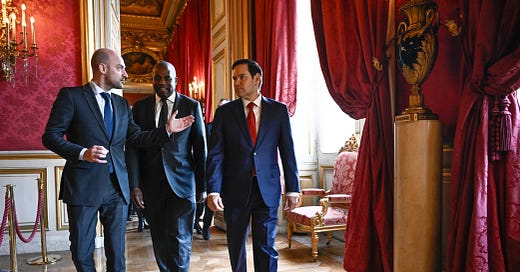U.S./Iran talks on ice
There is no prospect for the resumption of U.S. Iran negotiations anytime soon, a senior U.S. official told a source today.
Almost a month after the United States struck Iran nuclear sites with bunker buster bombs and submarine-launched missiles, the U.S. administration currently sees little prospect for resumed U.S.-Iran negotiations on a more long lasting Iran nuclear deal anytime soon, American officials say.
The diplomatic impasse comes as the Trump administration is discussing internally and with European and other allies the possibility of trying to seek a broader agreement with Iran.
One person described the U.S. consultations as evolving, and suggested there was some consideration about possibly seeking something broader, given the fact that Iran’s nuclear program was pushed back by the 12-day Israeli and U.S. bombing campaign.
President Trump in recent days has affected not to be in any rush to get back to the negotiating table with Iran, while insisting that Iran was eager to talk.
“They want to negotiate. They want to negotiate badly,” Trump said today of Iran, speaking with reporters at a meeting with visiting Bahraini Crown Prince and Prime Minister Salmon bin Hamad Al Khalifa. “We're in no rush.”
“They should have made a deal,” Trump added. “And then we bombed the hell out of their various places. … But if they want to negotiate, we’re here.”
‘Disconnect’ as U.S. ambitions on Iran grow more maximalist
While Iran is seeking guarantees that it won’t be attacked again should it return to negotiations, the Trump administration is becoming more convinced that increasing pressure on Iran could get more concessions, said International Crisis Group Iran program chief Ali Vaez.
“I think the view within the administration is that diplomatic, economic and military pressure on Iran should continue to increase until it accepts America's terms for a deal,” Vaez said in an interview.
“That view is, I think, certainly dominant within the administration,” Vaez said. “It is not that the military pressure has backfired or the economic pressure has plateaued. The view is that there is still much more that could be done, and more pressure, and more pain on Iran will produce more gain.”
But some of the pressure tactics that the U.S. and allies are considering could cause Iran to exit the non-proliferation agreement that obligates it, he said.
“I think the main difficulty here is that, right now, there is a means of putting pressure on Iran to restore IAEA access, because it's a violation of its safeguards agreements with the Agency,” he said. “But if snapback is triggered and Iran withdraws from the NPT, it's off the hook….
“But that's not how the administration sees it, and I think they're still riding high on the military achievements that they believe that they've had, and see no reason to soften the red lines,” he said. “This is where the disconnect is with the Iranians. The Iranians are expecting the US to provide them with security guarantees, which is not at all where the administration's mindset seems to be.”
France, the United Kingdom and Germany—the three European parties (“E3”) to the 2016 Iran nuclear deal--would trigger the so-called “snapback” mechanism re-imposing international sanctions on Iran if progress towards an agreement has not been reached by the end of August, France’s Foreign Minister said.
“France and its partners are…justified in reapplying global embargoes on arms, banks, and nuclear equipment that were lifted ten years ago,” French Foreign Minister Jean-Noel Barrot told reporters on Tuesday ahead of a meeting with fellow EU foreign ministers in Brussels. “Without a firm, tangible, verifiable commitment from Iran, we will do so by the end of August at the latest.”
But it’s not entirely clear what the Europeans—or Americans—are asking Iran to do in order to avoid snapback.
“It’s not yet clear to me,” a European official said of what the E3 are demanding of Iran. “They are discussing a lot between themselves.”
“The E3 are threatening snapback now in order to Iran to cooperate with the IAEA,” he said. “But the E3 are also very confused and disunited.”
Iran’s foreign ministry rejected the legitimacy of such action, and has threatened that if snapback is triggered, Iran will exit the nuclear Non-Proliferation Treaty (NPT).
“They have no standing to invoke the mechanism,” Iran Foreign Ministry spokesman Esmail Baghaei told reporters at a ministry press briefing on Monday. “The co-called snapback has no legal, political or ethical justification.”
The Iranian spokesman said that Iran remains open to diplomacy, but will not resume talks until there is “confidence in the effectiveness of diplomacy.”
**



